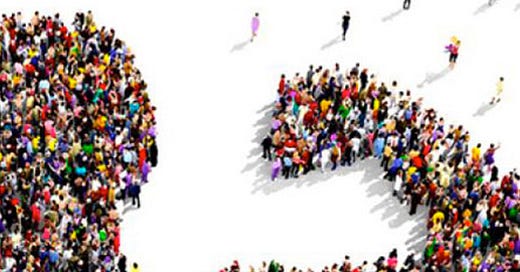When personal choices shouldn't just be personal
How people are validating their non-medical choice not to be vaccinated says volumes about the nature of American culture.
The vaccination “debate” continues. There is a whole separate conversation to be had about those scare quotes because what we are witnessing (and in many cases confronting and participating in) is not a debate about health or science but either a sad statement about the power of mis/disinformation or a political position and statement of identity masquerading as public health position. Separate from this dangerous politicization, the nature of an increasingly common justification is troubling in a very different way.
With the NBA season about to begin, the collision of The Associations’s COVID protocols (not mandating vaccines for players) with municipal COVID protocols (SF and NYC requiring vaccines for indoor events which includes the players and would force unvaccinated Nets, Knicks, and Warriors to miss at least half of their season in the form of all their home games) was been a major topic of the first media day of the season. As far as I have been able to discern, none of the players refusing vaccination are doing so for legitimate medical reasons (it is possible some of them have autoimmune conditions for instance but none that I’m aware of have stated that as their reason for refusing vaccination). The players refusing the vaccine and saying things like “it’s a personal choice” and “I'm doing my own research and making the right decision for my family” are either lying to themselves, to us, or are thoroughly lost in mis/disinformation. But importantly, the nature of their justification is particularly insidious and problematic. They claim they are making a “personal choice” during a public health crisis. Their justification, that society seems to be accepting on some level as valid, is that “I am selfish — it is not necessary that I care about other people.” It reflects a painful disconnect from others and a deeply troubling lack of recognition of their dependence on the people around them.
“Personal choice” — I guess. But it shouldn’t be. We should care as much about the neighbors we know as the neighbors we don’t as our own family. We should not make a personal choice as if we are in some way not completely dependent on the dozens of people around us we know and the thousands we don’t. That personal choice endangers people that make our lives possible. That personal choice threatens not just our own life but everyone’s life. It reveals a profound loss of community. A deeply institutionalized myth of self-reliance masquerading as some pseudo-libertarian self-determination. It’s a dangerous and largely unintentional lie that shows up all across our culture — and in this case is likely to actually cost lives. And it also reveals a hint at how we might reimagine our relationships to each other as the foundation for a better path.



